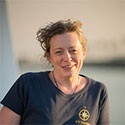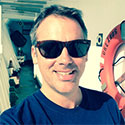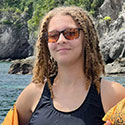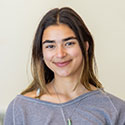Seascape Alaska 2: Aleutians Deepwater Mapping
(EX2303)
Exploration Team
Naming every expedition participant in a telepresence-enabled mission is next to impossible! Many researchers from dozens of institutions across the country have provided input into the expedition plan and are expected to participate. However, we've assembled information about the members of the team who are physically onboard NOAA Ship Okeanos Explorer.
And of course, none of this exploration would be possible without the work of the dedicated NOAA Commissioned Officer Corps and civilians who operate NOAA Ship Okeanos Explorer as part of NOAA's fleet managed by NOAA's Office of Marine and Aviation Operations.

Thomas Morrow
Expedition Coordinator, NOAA Ocean Exploration
Thomas Morrow is a physical scientist with NOAA Ocean Exploration. He spends his time working as an expedition coordinator on NOAA Ship Okeanos Explorer and supporting NOAA’s ocean exploration mission. Thomas is a marine geologist and geophysicist who started his ocean exploration career while earning his bachelor’s degree in geology at the University of Florida. He then moved to the University of Idaho for master’s and doctorate degrees in geological sciences, studying mid-ocean ridges, fracture zones, and hotspot seamounts. Prior to joining NOAA Ocean Exploration, Thomas spent several years as a postdoctoral research fellow at Boston College, coordinating missions to explore the Gofar transform fault on Research Vessel Atlantis and Research Vessel Thomas G. Thompson.

Roland Brian
Video Engineer, Global Foundation for Ocean Exploration
Roland Brian brings 38 years of electronics and satellite experience, with 29 of those years focusing on television and video engineering specialization. Throughout his early years in television, Roland worked to hone his skills and experience for various television stations and remote broadcasters as well as national broadcasters ranging from CBS, PBS, CNN, CNBC, MSNBC, ESPN, Fox Sports, and the Golf Channel. With a keen eye for precise high-quality, high-definition video, he really enjoys and helps bring the imagery to life for the viewers. Roland began his career in the U.S. Air Force where he worked as a satellite communications engineering technician with visions of working on the U.S. Space Station. He traded in that quest for one of deep-ocean exploration and sharing the beautiful imagery with the world. He has worked with NOAA Ocean Exploration since 2010 and plays an integral part in telepresence-enabled remotely operated vehicle (ROV) expeditions. He has also provided engineering design, integration, and operation services for other projects using various Global Foundation for Ocean Exploration (GFOE) and NOAA Ocean Exploration mobile telepresence systems. His duties aboard NOAA Ship Okeanos Explorer include operation and maintenance of the ship's telepresence and video and satellite systems, including those on ROVs Deep Discoverer and Seirios. Again, Roland’s experience embodies the breadth and depth of knowledge that GFOE and NOAA Ocean Exploration encourage. When not at sea, Roland enjoys life with his wife and family in sunny Sarasota, Florida.

Erin Heffron
Ocean Mapper and GIS Analyst, University Corporation for Atmospheric Research
Erin Heffron is an ocean mapper and GIS analyst who works with several organizations to acquire, process, and create products from ocean data, most often water column, seafloor, and substrate information acquired by split-beam, multibeam, and sub-bottom echosounders. She is also a graduate student studying ocean mapping applications related to the earth sciences at the University of New Hampshire Center for Coastal and Ocean Mapping/Joint Hydrographic Center, where she is nearing the completion of her master's degree.

Rose Leeger
Explorer-in-Training
Rose Leeger triple majored in marine biology, environmental science, and biology at Nova Southeastern University. She is a recipient of the NOAA Educational Partnership Program for Minority Serving Institutions (EPP/MSI) Scholarship, enabling her to complete two internships at NOAA science centers. Her first internship was with NOAA Fisheries Office of Aquaculture where her internship work, titled “An Irish Oyster Farmer and a CEO of an Aquaculture Research Company Discuss the Future of Probiotics,” was published on the NOAA Fisheries website. Her second summer internship was with the Antarctic ecosystem research division creating an algorithm for machine learning to identify penguin populations from drone imagery.
After graduation, Rose will be attending the University of Colorado at Boulder and will begin her Ph.D. next fall working on a National Science Foundation-funded project on marine protected areas in the Ross Sea, Antarctica. Her program will include field research in the Southern Ocean where she will analyze the otolith chemistry of the Antarctic toothfish, and she plans to include international policy of Antarctic waters as one of her dissertation chapters. Her long-term goal is to become a professor to inspire the next generation of scientists working for the conservation of polar ecosystems.

Jason Meyer
Mapping Watch Lead, University Corporation for Atmospheric Research
Jason Meyer first pursued his passion for seafloor exploration while earning a bachelor’s degree in geology from the University of Hawaiʻi at Hilo where he studied volcanic processes along the Hawaiian Islands. He later went on to receive his master’s in geology from the University of South Carolina, focusing on regional mapping and classification of seafloor volcanoes along the East Pacific Rise and the Galapagos Spreading Center in the Pacific Ocean. Since graduating in 2006, Jason has followed a career as a hydrographer, mapping and exploring the ocean as well as coasts, rivers, reservoirs, and lakes throughout North America, the Pacific, and the Atlantic. He has endured long hours and challenging conditions at the helm and the computer collecting data that serves maritime navigation, dredging and construction operations, environmental remediation projects, and academic exploration. Jason first sailed aboard NOAA Ship Okeanos Explorer in 2015 and has participated in more than 10 expeditions. While not at sea, he enjoys climbing, surfing, backpacking, and traveling with his family. Jason resides in Battle Ground, Washington.

Andrew O'Brien
Data Engineer, Global Foundation for Ocean Exploration
Andrew (Andy) O’Brien started his professional career in the U.S. Navy, where he ran a small electronic test system calibration laboratory and instructed NATO students in satellite ground station repair. Following the Navy, he obtained a bachelor’s degree in history and a master’s in computer science from the University of Vermont before joining Greensea Systems as the lead software engineer. During his tenure at Greensea, Andy designed, developed, and supported over 40 widely varying custom robot control systems and their operator interfaces for government and industry. Notably, Andy was the software lead on NOAA Ocean Explorations remotely operated vehicles Deep Discoverer and Seirios. Andy so enjoyed working with NOAA Ocean Exploration, and supporting their exploration mission, that he asked to join them. Andy now splits his time between developing software, managing science and engineering data, maintaining the satellite communications system, and navigating, piloting, and co-piloting the deep-submergence vehicles. During his free time, you can often find him in Coventry, Rhode Island.

Rebecca Ruiz
Explorer-in-Training
Rebecca Ruiz earned her bachelor’s degree in biology with a marine focus from Texas A&M University-Corpus Christi (TAMU-CC). During her undergraduate studies, she dedicated herself to developing her skills as a conservationist by participating in as many research and volunteer opportunities as possible. She studied the effects of marine protected areas on surrounding fish diversity as a part of a Research Experience for Undergraduates (REU) for the National Science Foundation’s Philippines Partnerships in International Research and Education (PIRE) Project; as well as the effects of hypoxia on Atlantic croaker in the Gulf of Mexico with the Walther Fish Ecology Lab at TAMU-CC. In 2022, she was a NOAA Center for Coastal and Marine Ecosystems scholar and volunteered with both NOAA and the U.S. Geological Survey aboard Research Vessel Point Sur for sediment analysis from locations affected by the Deepwater Horizon Oil spill. Rebecca loves hands-on, high-intensity field work, travel, and expanding bioinformatic skills. Her goal is to dedicate her efforts to low-income coastal communities to restore existing habitats and ensure natural resources continue to thrive.

Ranna Zahabi
Explorer-in-Training
Ranna Zahabi is a third-year history of public policy and law student at the University of California Santa Barbara. She loves the outdoors and enjoys spending her free time freediving and rock climbing. With her interest in science policy and data privacy law, Ranna hopes to apply her interdisciplinary studies further. She spent a period of time working in science communications for both NASA and the Arctic Data Center where her passion for exploration and innovation was fueled. As a NOAA Ocean Exploration explorer-in-training, Ranna looks forward to combining her love for the ocean, working with a team, and for learning in a sailing adventure.

Chris Wright
Data Engineer, Global Foundation for Ocean Exploration
Chris Wright holds a Bachelor of Science in business administration from the University of Mary Washington and a Master of Business Administration from Rollins College. After graduation, he worked as a network and systems administrator and engineer in the hospitality industry in the Northeast and Mountain West for more than 15 years. Recently relocating back to the East Coast, Chris joined the Global Foundation for Ocean Exploration (GFOE) data team in early 2019 as one of the newest members of the organization. In 2019, he completed his first expedition aboard NOAA Ship Okeanos Explorer and is extremely excited about continuing the journey to explore the oceans around the world. When he isn't sailing on Okeanos Explorer, he’s busy working in GFOE’s Quonset office planning, designing, and implementing data solutions to help refine and mature its base of operations for ocean exploration. Chris and his family currently reside in Newport, Rhode Island.